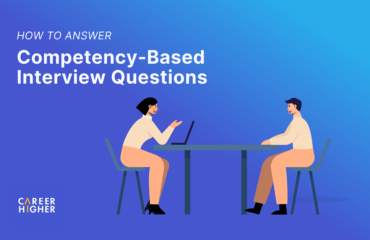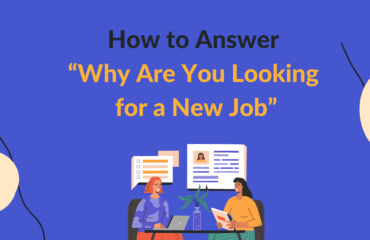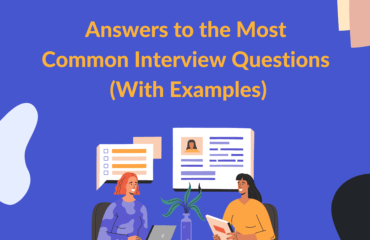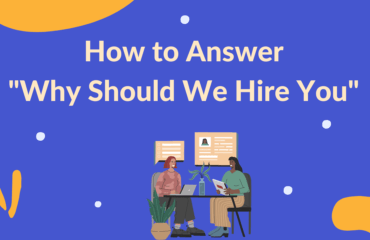Table of Contents
You are preparing for your upcoming interview. You have already practiced answers to potential interview questions, but do you know which interview questions are illegal? In this blog post, we will walk you through some interview questions that employers should not typically ask and tips to handle them with grace. Keep in mind that questions concerning the above might be collected anonymously during the screening phase, but they are optional for you to answer. In such cases, employers collect information for DEI purposes and this is not illegal.
Disclaimer: This is an attempt to cover basic rules that apply mainly, but not consistently, in the EU, UK, US, CA, and AUS. Even though our sources are based primarily on legal documents (such as the General Data Protection Regulation and EU Directive, the Equal Employment Opportunity, and ICO), we are not a legal company and readers should get further informed about their rights and what applies in local labor law.
1. Nationality & Ethnicity
Questions around your national origin and race shouldn’t be part of job interviews. However, when it comes to nationality, employers can and do ask you if you are eligible to work in the country. When it comes to ethnicity though, if you happen to participate in an interview and the recruiter or hiring manager asks you anything relevant, you are not obliged to answer. Examples:
- Where are you from?
- What is your background?
- What is your race?
2. Age
Joanne entered an interview once and was asked about her age. Filled by surprise, she asked the purpose of that question and the hiring manager explained that this position was part of a national funding program that aimed to support young people of a certain age. An employer has the right to ask for such information only if there is a legal basis, such as the example above. Otherwise, it is illegal to ask questions including:
- How old are you?
- When did you finish college?
- At what age did you start the x job?
3. Gender & Sexual orientation
Sex discrimination is a real problem and therefore questions about gender and sexual orientation are illegal during a job interview. Moreover, apart from the direct questions keep an eye open for questions that undermine gender equality indirectly, as these cross the line too. Examples:
- What is your gender?
- What is your sexual orientation?
- Can you manage a group of men?
4. Marital status
Most legislation about personal data makes clear their intention to protect each person’s privacy, including family. Unless you are willing to provide further information about your family, companies shouldn’t ask you about your marital status or intention to have children. Even if they offer parental benefits, during the hiring process, they ought to inform you, but not ask you for information. However, if you feel comfortable with sharing such information as part of a chit-chat, nothing stands in your way.
Examples:
- Are you married/single/divorced?
- Do you (want to) have any kids?
- What is your relative’s name that works in the x company?
5. Health condition/Disabilities/Genetic information
Data around your health is considered to be private and companies can only request them only if there is a legal basis that requires so. This applies to genetic information as well, either when it is about you or your family. Employers can ask you though if you are eligible to perform on a job, but nothing further. In addition, any discrimination around health conditions or disabilities is on the blacklist.
Examples:
- Do you have any health or mental health issues?
- Do you take any medication?
- Is there any medical disease running in your family?
6. Religious/Political beliefs
Unless you are willing to join a religious organization or political party, these matters are private and irrelevant to work. We advise you to avoid communicating any of your beliefs during the hiring process, as these could lead to biases and discrimination. Apart from that, these matters have no place in the workplace, so be mindful of what you share and to whom.
- Do you believe in God?
- What political party do you support?
- What do you think about the x political event?
7. Criminal record
According to GDPR and ICO, criminal history records can be obtained only when an official authority is in attendance and if the job requires it (eg. working with kids). However, in the US, employers can ask such questions, but EEOC prohibits criminal discrimination. Also, you should know that companies have the right to ask you to participate in drug tests and inquire about any current use of illegal substances. Examples:
- Have you ever been convicted of illegal activity?
- Have you ever been arrested?
- Have you ever been sued?
8. Salary history
The pay gap in terms of gender and race is an issue that has been acknowledged and is something that governments are working on. In late 2020, 19 states in the US have some sort of legislation banning the acquisition of any salary history from candidates, but Europe is not there yet. Apart from being a bad recruiting practice, information as such lets recruiters has the upper hand when it comes to salary negotiations. Even if you are not located in these states, we advise you to avoid answering such interview questions.
Examples:
- What is your current salary?
- How much were you paid for that job?
- What was your highest salary?
9. Tips to handle
Even though laws change towards creating more inclusive and protective processes, we are not there yet. You might face situations where you will be asked questions that are not job-related. To help you handle those situations, we have come up with some handy tips for you.
- Know your rights, obligations, and legal ways on how you can act. Knowledge is power and the only way to be able and handle a situation with delicacy.
- Request further information about the purpose of the question before judging. Remember Joanne? You can ask kindly “Could you tell me how this question is related to the job?”.
- Don’t be afraid to kindly refuse to answer questions. You can say something like “Thank you for your question, but I’m not comfortable with answering it right now.”. You can also add a sense of humor to your response by saying “I will answer that question once we are colleagues.”.
- Talk with an expert. An expert will guide and help you practice with mock interviews.
Looking at the bright side, legislation in many countries has started to take more into consideration and protect each individual. Although we have a long road ahead of us, it is best to get informed about all these changes and step up with a kind tone when needed. And as for a world with no discrimination, let us all try our best to get there.











